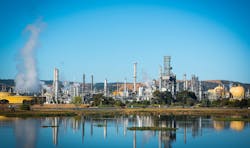Shell finalizes sale of Martinez refinery
Royal Dutch Shell PLC subsidiary Equilon Enterprises LLC (dba Shell Oil Products US) has completed the previously proposed sale of its 157,000-b/d dual-coking refinery and integrated logistics assets at Martinez, Calif., to PBF Energy Inc. subsidiary PBF Holding Co. LLC for $1.2 billion (OGJ Online, June 12, 2019).
Finalized on Feb. 1, the transaction includes sale of the refinery, adjacent truck rack and terminal, existing refinery inventory, crude oil supply, product offtake agreements, and other adjustments, Shell said.
Shell’s associated branded fuel businesses, aviation terminal, and catalysts business in the area were not part of this transaction.
As part of the sale agreement, Shell and PBF previously entered market-based, crude oil supply and product offtake agreements to continue supplying Shell-branded businesses, ensuring that Shell customers will continue having access to Shell-branded fuels.
PBF also has offered ongoing employment to local employees of the Martinez refinery.
PBF Energy and Shell said they also will jointly move forward with their previously announced plan to review feasibility of building a proposed renewable diesel project that would involve repurposing of existing idled equipment at the Martinez refinery to create a renewable fuels production plant at the site. Detailed feasibility review and planning for this project are scheduled to remain ongoing despite official closing of the Martinez transaction.
Shell—which plans to maintain a large presence in California with continued investments in its upstream and new energies business—said divestment of the Martinez refinery aligns with the company’s strategy to reshape refining efforts towards a smaller, smarter refining portfolio focused on further integration with Shell trading hubs, chemicals, and marketing to drive resilient returns.
By 2025, Shell said it expect to have interests and continue investing in a smaller, core set of refineries, a key advantage of which will come from further integration with Shell trading hubs and from producing more chemicals and other products resilient in a lower-carbon future, such as bitumen and base oils.
The planned Martinez sale follows a series of global downstream divestment initiatives by Shell during the last several years as part of the operator’s plan to concentrate its downstream footprint on a smaller number of assets and markets where it can be most competitive (OGJ Online, Apr. 22, 2019).
In a separate release, PBF Energy it paid a purchase price of $960 million plus the value of hydrocarbon inventory for the assets, which it financed with a combination of cash, including proceeds from its subsidiaries' $1-billion private debt offering in January of 2020, as well as borrowings under its existing revolving credit facility.
"The acquisition of Martinez is a significant strategic step for PBF as we expand our [US] West Coast operations. Martinez is a top-tier asset, a perfect complement to our existing assets, and provides increased opportunities for PBF's [USWC] operations to deliver value," said Tom Nimbley, PBF Energy’s chairman and chief executive officer.
With the acquisition, PBF Energy said it has increased its total throughput capacity to more than 1 million b/d to become the most complex independent refiner with a consolidated Nelson complexity index (NCI) of 12.8.
Located on an 860-acre site 30 miles northeast of San Francisco, Calif., the Martinez refinery is a high-conversion complex with an NCI of 16.1, making it one of the most complex refineries in the US. PBF Energy said the refinery’s strategic position in Northern California provides for operating and other synergies with subsidiary Torrance Refining Co. LLC’s 155,000-b/d refinery in Torrance, Calif.
Alongside the refinery and inventory, PBF Energy took ownership of Martinez’s on-site logistics assets, including a deep-water marine terminal, product distribution terminals, and refinery crude and product storage installations with about 8.8 million bbl of shell capacity.
About the Author
Robert Brelsford
Downstream Editor
Robert Brelsford joined Oil & Gas Journal in October 2013 as downstream technology editor after 8 years as a crude oil price and news reporter on spot crude transactions at the US Gulf Coast, West Coast, Canadian, and Latin American markets. He holds a BA (2000) in English from Rice University and an MS (2003) in education and social policy from Northwestern University.

